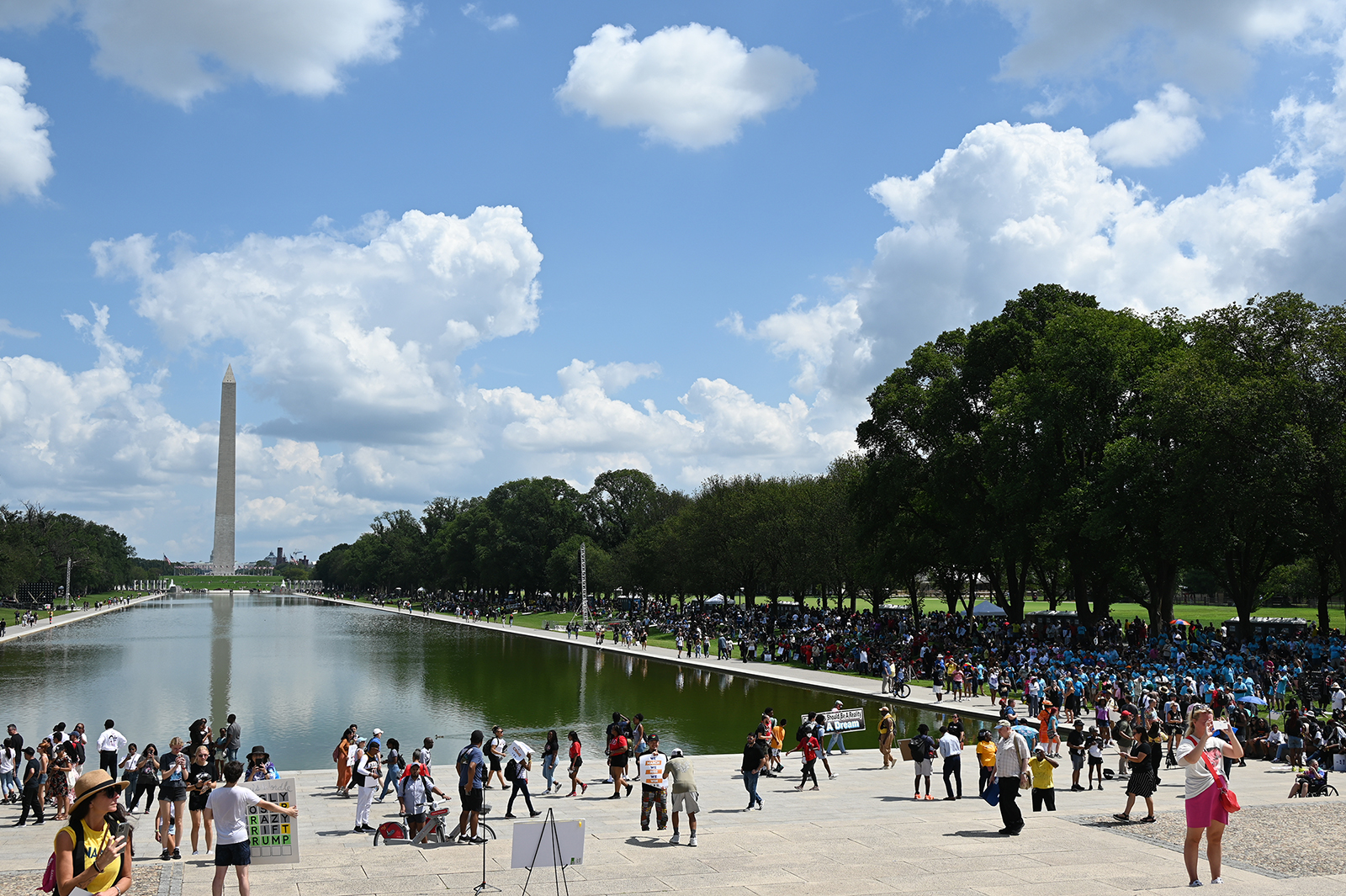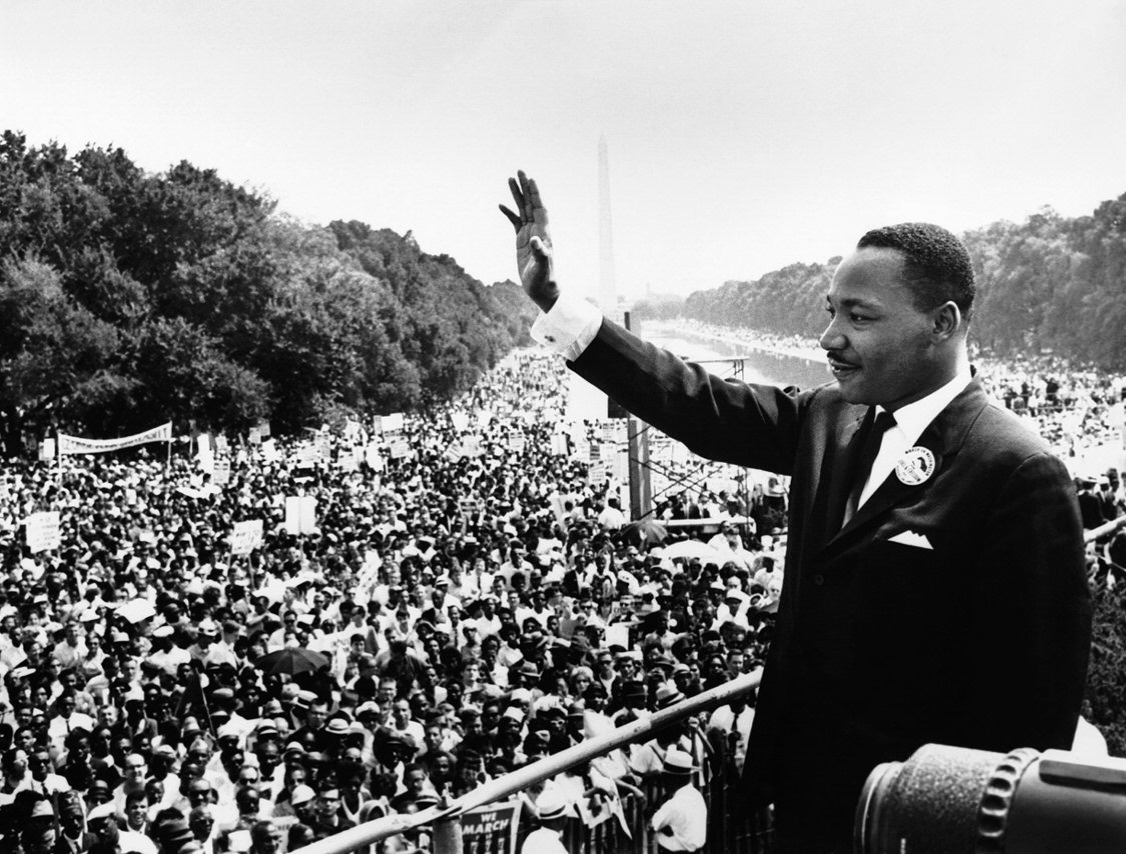
Attendees during the 60th anniversary of the March on Washington on Aug. 26, 2023. RNS photo by Jack Jenkins
(RNS) — On Aug. 26, tens of thousands gathered on the National Mall to mark the 60th anniversary of the March on Washington. Dubbed “Not A Commemoration, A Continuation,” the march and ensuing rally at the Lincoln Memorial sought to place a spotlight on the Rev. Martin Luther King Jr.’s vision of America as a country where the dignity of every human would one day truly be honored. The work is still so sorely needed to make that dream a reality.
Over the same weekend, another horrific racist killing spree took place in Jacksonville, Florida, motivated by white supremacist ideology. Six decades after King proclaimed his dream that we would all be “free at last” from racism and violence, and some 55 years after he himself was shot down by a racist gunman, Black lives are still threatened every day by race-based killings.
So, what can we learn from King’s dream today?
King understood that racism, militarism and economic inequality are deeply entangled and entrenched in our country’s past and present. He not only led the movement for civil rights and racial justice but went on to oppose the Vietnam War and to organize the Poor People’s Campaign. He fought for change with the power of nonviolence. “Our only hope today lies in our ability to recapture the revolutionary spirit,” he said, “and go out into a sometimes hostile world declaring eternal hostility to poverty, racism and militarism.”
As a Quaker, I’m called by my faith to heed his call. The Quaker Peace Testimony calls me to reject violence in all its forms, from direct killing and war to systems of oppression that value some lives over others. Our testimonies call me to respond to violence with courageous nonviolence and to respond to hate with human dignity and love.
Sixty years after the march, amid the ongoing slaughter of Black people in our streets, wars around the world and staggering economic inequality, we need to recapture King’s understanding of the relationship between militarism, racism and poverty.

The Rev. Martin Luther King Jr. addresses a crowd from the steps of the Lincoln Memorial, where he delivered his famous “I Have a Dream” speech during the Aug. 28, 1963, March on Washington for Jobs and Freedom. Photo courtesy of Creative Commons
In a 2021 report published by the Friends Committee on National Legislation, Salih Booker and Diana Ohlbaum explain how racism and militarism have always been deeply entwined and how they undergird our economy, our engagement with the world and our political system. The report proposes that “Dismantling entrenched racism and militarism—and the political and economic structures that reflect and reinforce them—will require new ways of working together.”
Indeed, we need to build new intersectional movements to educate and mobilize people to push for the necessary policy changes that help undo the structural realities of racism, militarism and economic injustice in our country.
What steps can we take now? In September, Congress will return from recess and should get serious about addressing racism and violence in our society. Members will need to hear from all of us that we cannot wait longer to take concrete steps in this ongoing march toward human dignity for all.
As a first step, Congress needs to invest in programs that enable people and communities to heal and thrive, such as housing assistance, health care, nutrition assistance for infants and new moms, and community violence intervention. Lawmakers could easily cover the costs of these vital programs by stopping the endless flow of money to the Pentagon for ships and weapons the Defense Department doesn’t need, hasn’t requested and doesn’t want.
Congress also needs to urgently expand the child tax credit, which led to the single biggest drop in child poverty on record and cut Black child poverty in half in its previously expanded form.
Finally, it is imperative to pass the John Lewis Freedom to Vote Act to help protect voting rights, as well as HR 40, legislation that would establish a commission to study and develop proposals for restorative justice for African Americans.
With so much at stake for our democracy and our world right now, we must insist that Congress act for a more just and peaceful world. Sixty years ago, King said, “Now is the time to make real the promise of democracy.” We have a long way to go to make that promise real, but we can keep marching.

Bridget Moix. Photo courtesy of FCNL.org
(Bridget Moix is general secretary of the Friends Committee on National Legislation and its associated Quaker hospitality center, Friends Place on Capitol Hill. The views expressed in this commentary do not necessarily reflect those of Religion News Service.)




